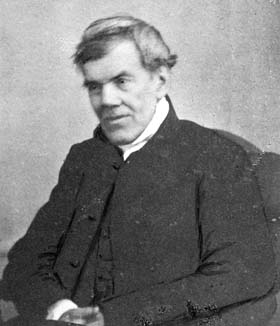


 تاريخ الرياضيات
تاريخ الرياضيات
 الرياضيات في الحضارات المختلفة
الرياضيات في الحضارات المختلفة 
 الرياضيات المتقطعة
الرياضيات المتقطعة
 الجبر
الجبر
 الهندسة
الهندسة 
 المعادلات التفاضلية و التكاملية
المعادلات التفاضلية و التكاملية 
 التحليل
التحليل
 علماء الرياضيات
علماء الرياضيات |
Read More
Date: 21-7-2016
Date: 14-7-2016
Date: 17-7-2016
|
Born: 9 April 1791 in Denton, England
Died: 8 November 1858 in Ely, England

George Peacock was educated at home by his father until he was 17 years old, then he attended a school in Richmond, Yorkshire (one of the nearest towns to Denton) to prepare for entering Cambridge. In 1809 he became a student at Trinity College, Cambridge.
As an undergraduate at Cambridge he made friends with John Herschel and Charles Babbage. In 1812 he graduated, placed second to John Herschel in the examinations. He also won the second Smith's prize. In 1814 Peacock was awarded a fellowship and, in the following year, he became a tutor and lecturer in Trinity College.
While undergraduates Peacock, Herschel and Babbage planned to bring reforms to Cambridge and, in 1815, they formed the Analytical Society whose aims were to bring the advanced continental methods of calculus to Cambridge.
In 1816 the Analytical Society produced a translation of a book of Lacroix in the differential and integral calculus. The following year Peacock became an examiner and used his position to further his reforms. He wrote to one of his friends saying
I assure you that I shall never cease to exert myself to the utmost in the cause of reform, and that I will never decline any office which may increase my power to effect it. ... It is by silent perseverance only, that we can hope to reduce the many-headed monster of prejudice and make the University answer her character as the loving mother of good learning and science.
Peacock published Collection of Examples of the Application of the Differential and Integral Calculus in 1820, a publication which sold well and helped further the aims of the Analytical Society.
In 1830 he published Treatise on Algebra which attempted to give algebra a logical treatment comparable to Euclid's Elements. He has two types of algebra, arithmetical algebra and symbolic algebra. In the book he describes symbolic algebra as
the science which treats the combinations of arbitrary signs and symbols by means defined through arbitrary laws.
He also said
We may assume any laws for the combination and incorporation of such symbols, so long as our assumptions are independent, and therefore not inconsistent with each other.
Peacock extended the rules of arithmetic using what he called the principle of the permanence of equivalent forms to give his symbolic algebra, so he was not as bold in practice as the abstract ideas for symbolic algebra which he gives in theory. He investigated the basic properties of numbers, such as the distributive property, that underlie the subject of algebra.
In 1831 the British Association for the Advancement of Science was set up. One of its first aims was to obtain reports on the state and progress of various sciences from leaders in their fields. Hamilton was asked to prepare a report on mathematics but he declined. Peacock was then asked and he accepted although he restricted his report to Algebra, Trigonometry and the Arithmetic of Sines. He read his report at the 1833 meeting of the Association in Cambridge and the report was subsequently printed.
In 1836 he was appointed Lowndean professor of astronomy and geometry at Cambridge and three years later was appointed dean of Ely cathedral, spending the last 20 years of his life there.
Peacock was a reformer for his whole life. He worked hard to reform the statutes of Cambridge University and, when the Government set up a Commission to propose reforms, he was appointed to it. Although he attended meetings of the Commission, he died before the report was finished.
Books:
Articles:



|
|
|
|
دراسة يابانية لتقليل مخاطر أمراض المواليد منخفضي الوزن
|
|
|
|
|
|
|
اكتشاف أكبر مرجان في العالم قبالة سواحل جزر سليمان
|
|
|
|
|
|
|
اتحاد كليات الطب الملكية البريطانية يشيد بالمستوى العلمي لطلبة جامعة العميد وبيئتها التعليمية
|
|
|